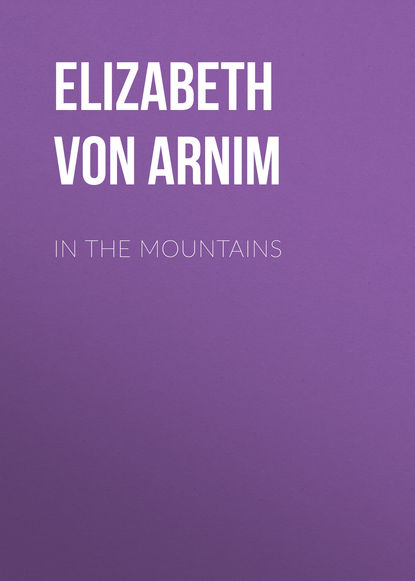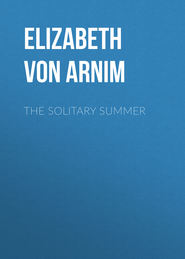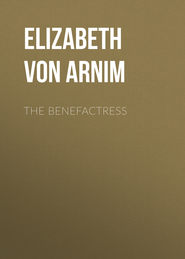По всем вопросам обращайтесь на: info@litportal.ru
(©) 2003-2024.
✖
In the Mountains
Настройки чтения
Размер шрифта
Высота строк
Поля
'C'est ma maman qui me les a donnés,' he said; and when I had done expressing my joy at their beauty and their fragrance, and my appreciation of his maman's conduct in having made my garden so lovely a present, he said that she had given them in order that, by brewing their leaves and applying the resulting concoction at the right moment, he and Mrs. Antoine might be cured of suppurating wounds.
'But you haven't got any suppurating wounds,' I said, astonished and disillusioned.
'Ah, pour ça non,' said Antoine. 'Mais il ne faut pas attendre qu'on les a pour se procurer le remède.'
Well, if he approaches every future contingency with the same prudence he must be kept very busy; but the long winters of the war up here have developed in him, I suppose, a Swiss Family Robinson-like ingenuity of preparation for eventualities.
What lovely long words I've just been writing. I can't be as convalescent as I thought. I'm sure real vigour is brief. You don't say Damn if your vitality is low; you trail among querulous, water-blooded words like regrettable and unfortunate. But I think, perhaps, being in my top layers very adaptable, it was really the elderly books I've been reading the last day or two that made me arrange my language along their lines. Not old books,—elderly. Written in the great Victorian age, when the emotions draped themselves chastely in lengths, and avoided the rude simplicities of shorts.
There is the oddest lot of books in this house, pitchforked together by circumstances, and sometimes their accidental rearrangement by Antoine after cleaning their shelves each spring of my absence would make their writers, if they could know, curdle between their own covers. Some are standing on their heads—Antoine has no prejudices about the right side up of an author—most of those in sets have their volumes wrong, and yesterday I found a Henry James, lost from the rest of him, lost even, it looked like, to propriety, held tight between two ladies. The ladies were Ouida and Ella Wheeler Wilcox. They would hardly let him go, they had got him so tight. I pulled him out, a little damaged, and restored him, ruffled in spite of my careful smoothing, to his proper place. It was the Son and Brother; and there he had been for months, perhaps years, being hugged. Dreadful.
When I come down to breakfast and find I am a little ahead of the café au lait, I wander into the place that has most books in it—though indeed books are in every place, and have even oozed along the passages—and fill up the time, till Mrs. Antoine calls me, in rescue work of an urgent nature. But it is impossible, I find, to tidy books without ending by sitting on the floor in the middle of a great untidiness and reading. The coffee grows cold and the egg repulsive, but still I read. You open a book idly, and you see:
The most glaring anomalies seemed to afford them no intellectual inconvenience, neither would they listen to any arguments as to the waste of money and happiness which their folly caused them. I was allowed almost to call them life-long self-deceivers to their faces, and they said it was quite true, but that it did not matter.
Naturally then you read on.
You open another book idly, and you see:
Our admiration of King Alfred is greatly increased by the fact that we know very little about him.
Naturally then you read on.
You open another book idly, and you see:
Organic life, we are told, has developed gradually from the protozoon to the philosopher, and this development, we are assured, is indubitably an advance. Unfortunately it is the philosopher, not the protozoon, who gives us this assurance.
Naturally then you read on.
You open—but I could go on all day like this, as I do go on being caught among the books, and only the distant anxious chirps of Mrs. Antoine, who comes round to the front door to clear away breakfast and finds it hasn't been begun, can extricate me.
Perhaps I had better not get arranging books before breakfast. It is too likely to worry that bird-like Mrs. Antoine, who is afraid, I daresay, that if I don't drink my coffee while it is hot I may relapse into that comatose condition that filled her evidently with much uneasiness and awe. She hadn't expected, I suppose, the mistress of the house, when she did at last get back to it, to behave like some strange alien slug, crawled up the mountain only to lie motionless in the sun for the best part of a fortnight. I heard her, after the first two days of this conduct, explaining it to Antoine, who however needed no explanation because of his god-like habit of never being surprised, and her explanation was that c'était la guerre,—convenient explanation that has been used to excuse many more unnatural and horrible things during the last five years than somebody's behaving as if she were a slug.
But, really, the accidental juxtapositions on my bookshelves! Just now I found George Moore (his Memories of my Dead Life, with its delicate unmoralities, its delicious paganism) with on one side of him a book called Bruey: a Little Worker for Christ, by Frances Ridley Havergal, and on the other an American book called The Unselfishness of God, and How I Discovered It.
The surprise of finding these three with their arms, as it were, round each other's necks, got me nearer to laughter than I have been for months. If anybody had been with me I would have laughed. Is it possible that I am so far on to-day in convalescence that I begin to want a companion? Somebody to laugh with? Why, if that is so....
But I'd best not be too hopeful.
August 4th.
This day five years ago! What a thrill went through us up here, how proud we felt of England, of belonging to England; proud with that extraordinary intensified patriotism that lays hold of those who are not in their own country.
It is very like the renewal of affection, the re-flaming up of love, for the absent. The really wise are often absent; though, indeed, their absences should be arranged judiciously. Too much absence is very nearly as bad as too little,—no, not really very nearly; I should rather say too much has its drawbacks too, though only at first. Persisted in these drawbacks turn into merits; for doesn't absence, prolonged enough, lead in the end to freedom? I suppose, however, for most people complete freedom is too lonely a thing, therefore the absence should only be just long enough to make room for one to see clear again. Just a little withdrawal every now and then, just a little, so as to get a good view once more of those dear qualities we first loved, so as to be able to see that they're still there, still shining.
How can you see anything if your nose is right up against it? I know when we were in England, enveloped in her life at close quarters, bewildered by the daily din of the newspapers, stunned by the cries of the politicians, distracted by the denouncements, accusations, revilings with which the air was convulsed, and acutely aware of the background of sad drizzling rain on the pavements, and of places like Cromwell Road and Shaftesbury Avenue and Ashley Gardens being there all the time, never different, great ugly houses with the rain dripping on them, gloomy temporary lodgings for successive processions of the noisy dead,—I know when we were in the middle of all this, right up tight against it, we couldn't see, and so we forgot the side of England that was great.
But when she went to war we were not there; we had been out of her for months, and she had got focussed again patriotically. Again she was the precious stone set in a silver sea, the other Eden, demi-Paradise, the England my England, the splendid thing that had made splendid poets, the hope and heart of the world. Long before she had buckled on her sword—how easily one drops into the old language!—long before there was any talk of war, just by sheer being away from her we had re-acquired that peculiar aggressive strut of the spirit that is patriotism. We liked the Swiss, we esteemed them; and when we crossed into Italy we liked the Italians too, though esteeming them less,—I think because they seemed less thrifty and enjoyed themselves more, and we were still sealed up in the old opinion that undiscriminating joyless thrift was virtuous. But though we liked and esteemed these people it was from a height. At the back of our minds we always felt superior, at the back of our minds we were strutting. Every day of further absence from England, our England, increased that delicious sub-conscious smugness. Then when on the 4th of August she 'came in,' came in gloriously because of her word to Belgium, really this little house contained so much enthusiasm and pride that it almost could be heard cracking.
What shall we do when we all get to heaven and aren't allowed to have any patriotism? There, surely, we shall at last be forced into one vast family. But I imagine that every time God isn't looking the original patriotism of each will break out, right along throughout eternity; and some miserable English tramp, who has only been let into heaven because he positively wasn't man enough for hell, will seize his opportunity to hiss at a neat Swiss business man from Berne, whose life on earth was blamelessly spent in the production of cuckoo-clocks, and whose mechanical-ingenuity was such that he even, so ran the heavenly rumours among the mild, astonished angels, had propagated his family by machinery, that he, the tramp, is a b—Briton, and if he, the b—b—b—Swiss (I believe tramps always talk in b's; anyhow newspapers and books say they do), doubts it, he'd b—well better come outside and he, the tramp, will b—well soon show him.
To which the neat Berne gentleman, on other subjects so completely pervaded by the local heavenly calm, will answer with a sudden furious mechanical buzzing, much worse and much more cowing to the tramp than any swear-words, and passionately uphold the might and majesty of Switzerland in a prolonged terrific whrrrrr.
August 5th.
I want to talk. I must be better.
August 6th.
Of course, the most battered, the most obstinately unhappy person couldn't hold out for ever against the all-pervading benediction of this place. I know there is just the same old wretchedness going on as usual outside it,—cruelty, people wantonly making each other miserable, love being thrown away or frightened into fits, the dreadful betrayal of trust that is the blackest wretchedness of all,—I can almost imagine that if I were to hang over my terrace-wall I would see these well-known dreary horrors crawling about in the valley below, crawling and tumbling about together in a ghastly tangle. But at least there isn't down there now my own particular contribution to the general wretchedness. I brought that up here; dragged it up with me, not because I wanted to, but because it would come. Surely, though, I shall leave it here? Surely there'll be a day when I'll be able to pack it away into a neat bundle and take it up to the top of some, arid, never-again-to-be-visited rock, and leave it there and say, 'Goodbye. I'm separate. I've cut the umbilical cord. Goodbye old misery. Now for what comes next.'
I can't believe this won't happen. I can't believe I won't go back down the mountain different from what I was when I came. Lighter, anyhow, and more wholesome inside. Oh, I do so want to be wholesome inside again! Nicely aired, sunshiny; instead of all dark, and stuffed up with black memories.
August 7th.
But I am getting on. Every morning now when I wake and see the patch of bright sunshine on the wall at the foot of my bed that means another perfect day, my heart goes out in an eager prayer that I may not disgrace so great a blessing by private gloom. And I do think each of these last days has been a little less disgraced than its yesterday. Hardly a smudge, for instance, has touched any part of this afternoon. I have felt as though indeed I were at last sitting up and taking notice. And the first thing I want to do, the first use I want to make of having turned the corner, is to talk.
How feminine. But I love to talk. Again how feminine. Well, I also love to listen. But chiefly I love to listen to a man; therefore once more, how feminine. Well, I'm a woman, so naturally I'm feminine; and a man does seem to have more to say that one wants to hear than a woman. I do want to hear what a woman has to say too, but not for so long a time, and not so often. Not nearly so often. What reason to give for this reluctance I don't quite know, except that a woman when she talks seems usually to have forgotten the salt. Also she is apt to go on talking; sometimes for quite a little while after you have begun to wish she would leave off.
One of the last people who stayed here with me alone in 1914, just before the arrival of the gay holiday group of the final days, was a woman of many gifts—le trop est l'ennemi du bien—who started, therefore, being full of these gifts and having eloquently to let them out, talking at the station in the valley where I met her, and didn't, to my growing amazement and chagrin, for I too wanted to say some things, leave off (except when night wrapped her up in blessed silence) till ten days afterwards, when by the mercy of providence she swallowed a crumb wrong, and so had to stop.
How eagerly, released for a moment, I rushed in with as much as I could get out during the brief time I knew she would take to recover! But my voice, hoarse with disuse, had hardly said three sentences—miserable little short ones—when she did recover, and fixing impatient and reproachful eyes on me said:
'Do you always talk so much?'
Surely that was unjust?
August 8th.
Now see what Henry James wrote to me—to me if you please! I can't get over it, such a feather in my cap. Why, I had almost forgotten I had a cap to have a feather in, so profound has been my humbling since last I was here.
In the odd, fairy-tale like way I keep on finding bits of the past, of years ago, as though they were still of the present, even of the last half hour, I found the letter this morning in a room I wandered into after breakfast. It is the only room downstairs besides the hall, and I used to take refuge in it from the other gay inhabitants of the house so as to open and answer letters somewhere not too distractingly full of cheerful talk; and there on the table, spotlessly kept clean by Antoine but else not touched, were all the papers and odds and ends of five years back exactly as I must have left them. Even some chocolate I had apparently been eating, and some pennies, and a handful of cigarettes, and actually a box of matches,—it was all there, all beautifully dusted, all as it must have been when last I sat there at the table. If it hadn't been for the silence, the complete, sunny emptiness and silence of the house, I would certainly have thought I had only been asleep and having a bad dream, and that not five years but one uneasy night had gone since I nibbled that chocolate and wrote with those pens.
Fascinated and curious I sat down and began eating the chocolate again. It was quite good; made of good, lasting stuff in that good, apparently lasting age we used to live in. And while I ate it I turned over the piles of papers, and there at the bottom of them was a letter from Henry James.
I expect I kept it near me on the table because I so much loved it and wanted to re-read it, and wanted, I daresay, at intervals proudly to show it to my friends and make them envious, for it was written at Christmas, 1913; months before I left for England.
Reading it now my feeling is just astonishment that I, I should ever have had such a letter. But then I am greatly humbled; I have been on the rocks; and can't believe that such a collection of broken bits as I am now could ever have been a trim bark with all its little sails puffed out by the kindliness and affection of anybody as wonderful as Henry James.
Here it is; and it isn't any more vain of me now in my lamed and bruised condition to copy it out and hang on its charming compliments than it is vain for a woman who once was lovely and is now grown old to talk about how pretty she used to be:
21 Carlyle Mansions,
Cheyne Walk, S.W.,
December 29th, 1913.
Dear—











